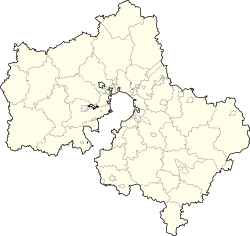Orekhovo-Zuevo
| Orekhovo-Zuyevo (English) Орехово-Зуево (Russian) |
|
|---|---|
| - City - | |
 Old Orekhovo-Zuyevo Administration building |
|
 Location of Moscow Oblast in Russia |
|
|
|
|
|
|
|
|
|
|
| Administrative status (as of January 2013) | |
| Country | Russia |
| Federal subject | Moscow Oblast |
| Administratively subordinated to | Orekhovo-Zuyevo City Under Oblast Jurisdiction |
| Administrative center of | Orekhovo-Zuyevsky District, Orekhovo-Zuyevo City Under Oblast Jurisdiction |
| Municipal status (as of June 2011) | |
| Urban okrug | Orekhovo-Zuyevo Urban Okrug |
| Administrative center of | Orekhovo-Zuyevo Urban Okrug, Orekhovo-Zuyevsky Municipal District |
| Head | Oleg Aparin |
| Statistics | |
| Area (urban okrug) (June 2011) | 36.386 km2 (14.049 sq mi) |
| Population (2010 Census) | 120,670 inhabitants |
| - Rank in 2010 | 135th |
| Density | 3,316/km2 (8,590/sq mi) |
| Time zone | MSK (UTC+03:00) |
| Founded | 1917 |
| City status since | 1917 |
| Postal code(s) | 142600—142619 |
| Dialing code(s) | +7 496 |
|
|
|
| on | |
Orekhovo-Zuyevo (Russian: Оре́хово-Зу́ево) is an industrial city in Moscow Oblast, Russia, located 85 kilometers (53 mi) east of Moscow in a forested area on the Klyazma River (a tributary of the Oka). Orekhovo (Russian: Оре́хово), often pronounced only as Orekh, is a Russian word which means walnuts, walnut wood, or walnut trees. The city was established in 1917 when three villages (Orekhovo, Zuyevo, and Nikolskoye) were merged, hence its name. Population: 120,670 (2010 Census);122,248 (2002 Census);137,198 (1989 Census).
The first known facts about what now is Orekhovo-Zuyevo date back to 1209. The place was mentioned in the Moscow Chronicles as the place called "Volochok" where the battle between Vladimir's prince Yury and Ryazan's prince Izyaslav took place. The name "Volochok" (or, as it was later called, "Zuyev Volochok") is derived from the Slavic word for "portage": a place where wooden ships were carried by land from one river to another. In this place in particular, the ships were usually moved by land between the Klyazma and Nerskaya Rivers. The villages Orekhovo and Zuyevo were mentioned in the chronicle several more times during the Middle Ages.
In 1797, serf peasant Savva Vasilievich Morozov (Russian: ) opened his first silk factory in Zuyevo. Later he shifted from silk to wool. In 1823, profits from his business allowed him to be freed from serfdom. In 1830, he moved his factories to the opposite bank of the Klyazma River to the place that was later named Nikolskoye.
...
Wikipedia



